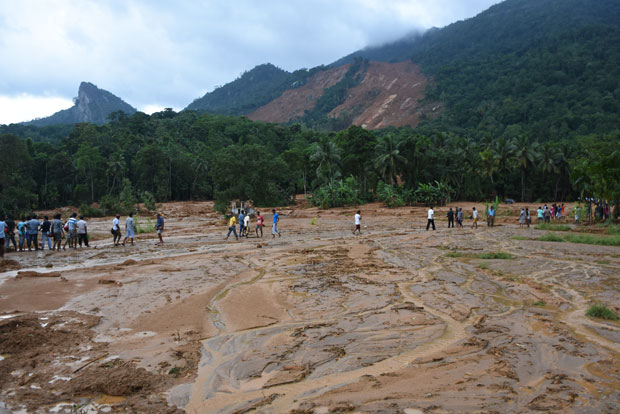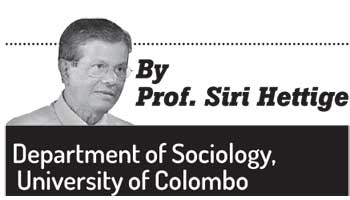Reply To:
Name - Reply Comment
Faced with a whole range of day to day issues, many people today do not pay much attention to bigger issues like climate change. Which, in the long run, is likely to make life on earth even more complex, difficult and unpredictable, unless diverse global and local level efforts to arrest the trend succeed. It is against such a background that some of the global efforts like Climate Change Agreement and SDG’s become complementary. On the other hand, effectiveness of global initiatives depends very much on what happens at national and local levels.
 Aranayaka Land slide (2016 File Photo)
Aranayaka Land slide (2016 File Photo)
Is the present international politico- economic environment conducive for the development of a new global compact on climate change and sustainable development? The developments over the last several years do not encourage us to answer the above question in the affirmative. The massive exodus of refugees from North Africa, the Middle East and elsewhere that exerted unprecedented  economic and political pressure on Europe did not necessarily produce positive political outcomes in the West in general. The election of Donald Trump in the United States, Brexit vote in the UK and the rise of right wing political parties in a number of European countries are examples. Neo-liberal globalization that has weakened progressive state policies in many countries contributed to social issues at home and abroad such as rising inequality, weakening of social citizenship, increasing ethno-religious tensions and conflicts. Rising public debts in many countries prevented them from investing in critically important social sectors like health, public transport and education, pushing even low income groups towards private solutions to various problems they face. The results are unplanned urbanization, environmental pollution, labour migration, proliferation of unregulated urban settlements, and increasing crime and violence.
economic and political pressure on Europe did not necessarily produce positive political outcomes in the West in general. The election of Donald Trump in the United States, Brexit vote in the UK and the rise of right wing political parties in a number of European countries are examples. Neo-liberal globalization that has weakened progressive state policies in many countries contributed to social issues at home and abroad such as rising inequality, weakening of social citizenship, increasing ethno-religious tensions and conflicts. Rising public debts in many countries prevented them from investing in critically important social sectors like health, public transport and education, pushing even low income groups towards private solutions to various problems they face. The results are unplanned urbanization, environmental pollution, labour migration, proliferation of unregulated urban settlements, and increasing crime and violence.
Many developing country governments have become ‘fire fighters’ trying to defuse multiple crises that crop up in various sectors rather than plan and implement long-term evidence based policies. Sri Lanka’s most recent tragedy surrounding the massive garbage mountain in Colombo resulting in the death of many people in the vicinity of the dump is a case in point. We are likely to face many such tragedies in the months and years to come, largely because the state continues to fail in regulating public affairs through a process of formulation and implementation of rational public policies.
On the other hand, the responsiveness of the State to diverse challenges societies face depends on a whole range of factors, not just it’s ideological orientation. The capacity of public institutions to investigate issues and come up with possible remedies or policy responses is critically important. It is in this sense that institution building is an important part of political development in any country. What is important here is not only the establishment of institutions but also their sustenance, renewal and revamping in keeping with the emerging of new challenges. Some of the new challenges we face today are connected with climate change. Economic policy shifts and proliferation of natural and human induced disasters also give rise to many challenges. In such context, improving social resilience has become a highly significant prerequisite for ensuring the well-being of citizens, in particular, more vulnerable segments of the population. This is particularly so with respect to increasing disaster risks generated by extreme weather events due to climate change as well as human induced incidents like the one we witnessed in Colombo in April, 2017.
"Economic policy shifts and proliferation of natural and human induced disasters also give rise to many challenges. In such context, improving social resilience has become a highly significant prerequisite for ensuring the well-being of citizens, in particular, more vulnerable segments of the population"
How can we reduce disaster risks and increase societal resilience? One major step that all countries need to take is to adopt evidence based policy making as a key strategy to deal with environmental and climate change related issues. Yet, this is possible only when strong institutions with the necessary resources and capacities exit. The institutions concerned are diverse and include universities, research institutions, regulatory bodies and implementing agencies. As is well known, in many countries there often exist institutions but they do not have the capabilities necessary to perform vital functions. Hence the need for interventions aimed at building their diverse capacities. Since evidence based policy making demands credible data and information,the generation of such data and information becomes critical. In the developing world, this cannot be taken for granted, as, due to various reasons, universities and research institutions do not perform this vital function in a satisfactory manner. One major obstacle is the lack of adequately trained research staff.
The above state of affairs deserves urgent attention. The need of the hour is to strengthen the research capacities of universities and their research staff. While this is essentially a responsibility of the governments, international collaboration can also play a vital role. In the remainder of this article, an attempt is made to provide a brief account of such an initiative, namely an international partnership, named ASCENT, Advancing Skill Creation To Enhance Transformation.
The above partnership involves 14 countries in Europe and Asia including Sri Lanka. While three universities from Sri Lanka participate in the research network, namely Ruhuna, Moratuwa and Colombo, Neurusan university from Thailand and research universities in Bangladesh are also partners. The project is coordinated by researchers based at the Huddersfield University, UK. Several European universities from such countries as Sweden, Lithuania and UK are also part of the collaborative network. Among other things,the research network strives toward building research and dissemination capacities of young researchers drawn from Asian universities with the able guidance of well-established academics from most of the participating universities. This objective of the network is expected to be achieved through periodic training workshops and conferences during the project period at different locations. One such training event took place a few months ago at Ruhuna University with the participation of over 60 young researchers including those from the above mentioned three partner universities in Sri Lanka.
It hoped that development of research and dissemination capacities of young researchers through international partnerships like ASCENT would strengthen the local universities in order for them to play an important part in the area of policy and program development at both institutional and national levels. This is important because we cannot afford to rely on ad hoc policies in an increasingly complex global and local environment, particularly in view of the deepening global environmental crisis characterized by global warming and related consequences as well as more frequent and increasingly more devastating natural and human induced disasters. It is critically important that countries build effective institutions and possess well trained and highly skilled personnel to manage them. This should in fact be a national priority for government and relevant public and private institutions.